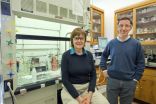(Press-News.org) Pro-life Americans are less likely to hear about the abortions women they know have had than are pro-choice Americans, a New York University study shows. The findings, which appear in the journal Sociological Science, point to a previously unexplored divide on the abortion issue: differences in perceptions of those we associate with.
"Americans who are opposed to abortion are less likely to hear that their sister, mother, or friend had an abortion than their pro-choice peers," says Sarah K. Cowan, an assistant professor in NYU's Department of Sociology and the study's author. "Abortions are often kept secret both by women who have had them and by their confidants. Moreover, abortions are especially likely to be kept secret from those who are pro-life. These disclosure differences affect who hears about others' abortions and may help explain the relative stability of Americans' opinions on abortion."
The research relied on a nationally representative survey of more than 1600 American adults who reported on their knowledge of others' and their own experiences (or their partner's experiences) of abortion and miscarriage. The results, which controlled for several variables, revealed that Americans who hold restrictive views on abortion are much less likely to hear of others' abortions than are Americans who hold liberal views on abortion. Specifically, those who believe abortion should be legal under no circumstance are 21 percent less likely to have heard about another having an abortion than are those who believe abortion should be generally available.
In addition, those who fall between the "pro-life" and "pro-choice" camps—those who believe abortion should be legal only in the cases of rape, incest, or to save the life of the pregnant woman—are 12 percent less likely to have heard about another having an abortion than are those who believe abortion should be generally available.
The study design, Cowan notes, reduces the likelihood that the results merely reflect association differences among groups—that is, pro-life Americans are less likely to say they know someone who has had an abortion because they tend to associate with those who are less likely to undergo this procedure.
The research does so by controlling for a range of characteristics that could reveal such associative differences—these include race, age, religion, political party affiliation, and religious service attendance among others. Even after taking these into account, there exists a substantial difference in the likelihood of hearing an abortion secret by one's attitude toward abortion.
These findings vary notably from those pertaining to miscarriages. Overall, according to the survey, 77 percent of women and their partners who experienced a miscarriage go on to tell someone else; for each miscarriage they tell, on average, 2.63 people. However, only 66 percent go on to share their abortion secrets to an average of 1.24 people. Similarly, when people are sharing news about another's pregnancy loss, they more often talk and to more people about a miscarriage than an abortion.
National abortion and miscarriage rates indicate abortion is the more common event. That is, one in three American women will have an abortion in her lifetime and more recognized pregnancies end in abortion than in miscarriage, according to the Centers for Disease Control and the Guttmacher Institute. In contrast to this, Cowan's research shows, however, that more Americans have heard of another's miscarriage than an abortion – 79 percent have heard of a miscarriage and 52 percent of an abortion. This discrepancy arises from differences in disclosure.
"A third of women who have had an abortion have kept it a secret from someone with whom they usually talk about personal matters," explains Cowan, who is also a Robert Wood Johnson Foundation Health and Society Scholar at Columbia University. "In addition, one quarter of confidants also keep the secret. Abortions are predominantly kept secret from immediate family members. People keep abortions – their own and others' -- a secret for reasons of privacy and to protect the woman who had the abortion from stigma."
This reaction to stigma results in abortions being kept secret particularly from people who opposed to abortion, she observes.
"American women of all backgrounds have abortions, but pro-choice Americans are more likely to hear of them than their peers who are opposed to legalized abortion," Cowan notes. "These differences in what Americans hear can affect public opinion, potentially helping explain the relative stability in public opinion on abortion over the past 30 years."
INFORMATION:
The data collection was funded by the National Science Foundation and the University of California, Berkeley. While conducting this research, Cowan was supported by the National Institutes of Health, the Face Value fellowship at Harvard University, and the Robert Wood Johnson Health and Society Scholars program.
NYU study points to perception divide in abortion: Whom we think we know
2014-11-03
ELSE PRESS RELEASES FROM THIS DATE:
Thirdhand smoke: Toxic airborne pollutants linger long after the smoke clears
2014-11-03
Ever walked into a hotel room and smelled old cigarette smoke? While the last smoker may have left the room hours or even days ago, the lingering odors—resulting from noxious residue that clings to walls, carpets, furniture, or dust particles—are thanks to thirdhand smoke.
Scientists at the U.S. Department of Energy's Lawrence Berkeley National Laboratory (Berkeley Lab), who have made important findings on the dangers of thirdhand smoke and how it adsorbs strongly onto indoor surfaces, have published a new study assessing the health effects of thirdhand smoke ...
New study shows women have higher risk of injury than men
2014-11-03
A new study of emergency department patients in 18 countries, made available online today by the scientific journal Addiction, shows that the risk of injury caused by acute alcohol consumption is higher for women compared with men. While the risk of injury is similar for both men and women up to three 'standard' drinks (containing 16 ml or 12.8 g of pure ethanol), the risk then increases more rapidly for women, becoming twice the risk to men around 15 drinks and three times the risk to men around 30 drinks. In this study the drinks were reportedly consumed within six ...
Smoking is a pain in the back
2014-11-03
CHICAGO --- If you want to avoid chronic back pain, put out the cigarette. A new Northwestern Medicine® study has found that smokers are three times more likely than nonsmokers to develop chronic back pain, and dropping the habit may cut your chances of developing this often debilitating condition.
"Smoking affects the brain," said Bogdan Petre, lead author of the study and a technical scientist at Northwestern University Feinberg School of Medicine. "We found that it affects the way the brain responds to back pain and seems to make individuals less resilient to an ...
Study shows clear new evidence for mind-body connection
2014-11-03
For the first time, researchers have shown that practising mindfulness meditation or being involved in a support group has a positive physical impact at the cellular level in breast cancer survivors.
A group working out of Alberta Health Services' Tom Baker Cancer Centre and the University of Calgary Department of Oncology has demonstrated that telomeres – protein complexes at the end of chromosomes – maintain their length in breast cancer survivors who practise meditation or are involved in support groups, while they shorten in a comparison group without ...
Biosimilar drugs could create billions in health care savings, study finds
2014-11-03
Introducing competing "biosimilar" versions of complex biologic drugs used to treat illnesses such as cancer and rheumatoid arthritis could cut spending on biologics in the United States by $44 billion over the next decade, according to new analysis from the RAND Corporation.
While biologics have advanced medical treatment for many conditions, they often are expensive and patient copays for some biologics can be several thousand dollars per year. In 2011, eight of the top 20 drugs in the United States in terms of sales were biologics and the annual spending on the drugs ...
Pain and depression place older adults at risk of delirium following surgery
2014-11-03
BOSTON—New research reports that preoperative pain and depressive symptoms in older adults place them at greater risk of delirium following surgery. According to the findings published today in The Lancet Psychiatry journal, both pain and depression are independent and interactive risk factors for delirium, suggesting a cumulative effect.
Individuals with delirium experience a sharp decline in attention and mental function. Older adults are especially susceptible to delirium following surgery, occurring in up to 51% of surgical patients 65 and older. Moreover, depression ...
Dance choreography improves girls' computational skills
2014-11-03
Clemson researchers find that blending movement and computer programming supports girls in building computational thinking skills, according to an ongoing study funded by the National Science Foundation and emerging technology report published in journal Technology, Learning and Knowledge.
Even with increasing demands for computationally savvy workers, there is a lack of representation among women in science, technology, engineering and mathematics fields (STEM), the researchers say.
"We want more diverse faces around the table, helping to come up with technological ...
Even when you're older you need chaperones
2014-11-03
Aging is the most significant and universal risk factor for developing neurodegenerative diseases, such as amyotrophic lateral sclerosis (ALS) and Alzheimer's, Parkinson's and Huntington's diseases. This risk increases disproportionately with age, but no one really knows why.
Now a team of scientists from Northwestern University, Proteostasis Therapeutics, Inc. and Harvard University has uncovered some clues. The researchers are the first to find that the quality of protective genes called molecular chaperones declines dramatically in the brains of older humans, both ...
Coenzyme Q10 helps veterans battle Gulf War illness symptoms
2014-11-03
Roughly one-third of the 700,000 United States troops who fought in the 1990-1991 Persian Gulf War have subsequently developed a distinct set of chronic health problems, dubbed Gulf War illness. Their symptoms, from fatigue, muscle pain and weakness to decreased cognitive function and gastrointestinal and skin problems, persist decades after the conflict.
In a study published in the Nov. 1 issue of Neural Computation, researchers at the University of California, San Diego School of Medicine report that a high quality brand of coenzyme Q10 (CoQ10) – a compound ...
Hurricane Vance dwarfs developing low pressure area
2014-11-03
NOAA's GOES-West satellite captured an image of Hurricane Vance and a much smaller developing low pressure area in the Eastern Pacific Ocean on Nov. 3. Vance's tropical-storm force winds extended to about 250 miles in diameter.
NOAA's GOES-West satellite captured an infrared image of the Eastern Pacific that showed Hurricane Vance was a couple of times larger than the developing low pressure area known as System 94E to the southeast of the hurricane. In the GOES image, taken Nov. 3 at 1200 UTC (7 a.m. EST/4 a.m. PST) clouds and showers extending from Vance's northern ...


